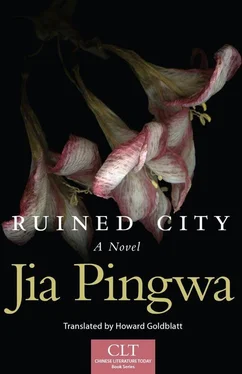“Is this how you answer the phone at home, Liu Yue?”
“Oh, it’s you, Zhuang Laoshi!” she said when she heard his voice. “There have been so many calls for you. I tell them you’re not home, but they keep calling back. So Dajie told me to tell callers they’ve dialed the wrong number. I didn’t expect to miss your call.”
Still upset, Zhuang said, “Who’s there talking to her?”
“It’s Hong Jiang. He came to see you. Do you want to talk to him?”
Hong Jiang came to the phone. After hemming and hawing, he told Zhuang that the books had been printed two days before. He had distributed them to booksellers, and they were selling well. He went on and on, but when Zhuang failed to respond, he said: “Did you hear what I said, Zhuang Laoshi?”
“Yes.”
“We made a killing this time. I did a rough count. We could reap a net profit of thirty thousand from an investment of a hundred thousand. Judging by what’s happening now, I think we’ll need to do another print run of ten thousand copies in ten days. I’m wondering if we should do something to show our appreciation to Mr. Jia of the Post Office Distribution Section. He’s someone we need to treat well, since, in addition to the official channels, he has an underground distribution network. If you agree, could we meet today or tomorrow?”
“I’m busy. Why don’t you talk to Shimu?” Zhuang said and hung up. He spread out the bedding to sleep until dinnertime.
After dinner he went into the yard, but Tang Wan’er was not there. A Qin opera was staged that night for the attendees, many of whom were strolling in small groups. Someone called to Zhuang to come with them; he responded with the excuse that he had to go home for some out-of-town guests. When the operagoers had all left, he went back to his room to wait for Wan’er. Then he thought he ought to have something for her, so he bought a pack of chewing gum at the gift shop. He was barely back inside when Huang Defu knocked at his door.
“The mayor is looking for you.”
“Really?”
Zhuang went with Huang to a suite on the second floor. They saw the mayor sitting on a sofa, smoking a cigarette. He rose when he saw Zhuang.
“Here’s our famous writer. Since you’re here, why haven’t you come to see me?”
“You’re a busy man, I didn’t want to bother you.”
“I might not see others, but how could I say no to you? Defu mentioned your request, and of course you have my support. People say I focus so much on cultural affairs that I ought to be the culture chief, not the mayor. Since that’s what they think, I really ought to do something for the intellectuals. You can have the unit at the nunnery, and don’t forget to tell me about future activities if you think I’m a worthy audience.”
“Thank you so much, Mr. Mayor.” Zhuang jumped to his feet. “You really have your finger on Xijing’s pulse when you focus on culture. When cultural activities set the stage, economic development has a place to put on a show. This is not about culture alone. I don’t know much about other areas, but I know your accomplishments are well known and highly regarded in cultural and artistic circles.”
“Give him the key, Defu.”
Huang took out the housing authorization and a key. “The mayor has thought of everything. He said you’d have to go see different people if you applied for the authorization yourself, and he didn’t want writers wasting their time, so he had me take care of it earlier.”
Zhuang was moved as he took the key.
“Come see me in the future if you folks need anything,” the mayor said. “I know about Xijing’s four celebrities, but I’ve only met two of them, you and Ruan Zhifei. Defu, pick a Sunday and get all four of them together for a meal so I can get to know them.”
“That would be wonderful,” Huang said. “Throughout his life, Premier Zhou Enlai befriended cultural figures, saying a major statesman must have friends who are writers and artists.”
“They’re all city treasures,” the mayor said. “As the ancients said, officials come and go, but the yamen is ironclad, there forever. I may be the mayor today, but I’ll be a nobody tomorrow when I step down. But you’re different. With your good works, you will leave a glorious legacy.”
“You’re too modest, Mr. Mayor,” Zhuang said with a smile. “What we do is ephemeral. When I was at Liufu Street, I saw them building a water-storage unit, and on the wall a sign had been painted: ‘Remember the mayor every time you drink the water.’ I was deeply moved; what leaves a glorious legacy are practical contributions to the people. Hangzhou’s Baidi and Sudi levees, as well as the Zuogongliu in Gansu, are the perfect examples.”
The mayor laughed, obviously pleased.
“The area around Liufu did not have tap water, and the residents had to take pots and jugs to places three li away to get water, which was a huge burden in the summer. The people were very unhappy about it. When I learned about the problem, I demanded an explanation from the heads of the city construction bureau and the water company. Of course they pleaded all sorts of practical difficulties. That really angered me. I told them I didn’t care how many excuses they had. How can a modern city like Xijing still have an area that is not supplied with tap water? I told them to make water available in ten days. If I didn’t see tap water on the eleventh, I’d fire them. Guess what, tap water was running by the ninth day. Thousands of people clanged gongs, banged drums, and set off firecrackers that day; they even wanted to make a plaque to be delivered to City Hall. I told Defu to stop them from doing that and said to myself that the people are simply wonderful. They won’t forget you if you really care and do something for them.”
“This is a great topic,” Zhuang said. “We should get someone from the Writers’ Association to write about it.”
“No, please don’t do that. I don’t want to take the credit. But I do have an article here, not by anyone in this office, which they showed me for approval. I think it’s quite well written. I’ve been told that the provincial paper is going to publish it, but I don’t know when. They tell me there’s a terrible practice that requires that you know someone even to publish in party newspapers. That’s outrageous.” The mayor took out the manuscript and handed it to Zhuang. “Why don’t you have a look?”
Zhuang took the manuscript.
“Defu, why don’t you and our celebrity writer go read it in your room? I have a meeting with the party secretary in three minutes. I will come see you in your room when I’m free, Zhidie. You’re in 703, aren’t you?”
“Just give me a call and I’ll come down to see you.”
Zhuang and Huang went into the adjoining room. “Go ahead, you read it first,” Huang said.
The article was titled “The mayor takes command as a vanguard of reform,” with the subtitle “New trends in the Xijing City Hall.” It was a rebuttal to the criticism in Weekend .
“Did you read the article in Weekend today?” Huang asked. “It’s a political maneuver. Articles like that should be published in the city paper, but they chose to print it in Weekend , making their objective clear — they want to malign the work of City Hall before the election. That article has had terrible repercussions, and our investigation shows that it was written by people working for the chairman of the People’s Congress. We rushed this one out this morning and decided to print it in both the provincial and the city papers. There’s no problem with the city paper, but the provincial and city papers have a history of not working well together. We have no control over the provincial paper. You know people there, so you should talk to them and get their assurance that it will appear tomorrow as headline news. You can decide who you need to work on, and don’t worry about money. We can come up with ten or twenty thousand, or more, to buy the spot if necessary.”
Читать дальше


![Matthew Vincent - [you] Ruined It for Everyone!](/books/216429/matthew-vincent-you-ruined-it-for-everyone-thumb.webp)









